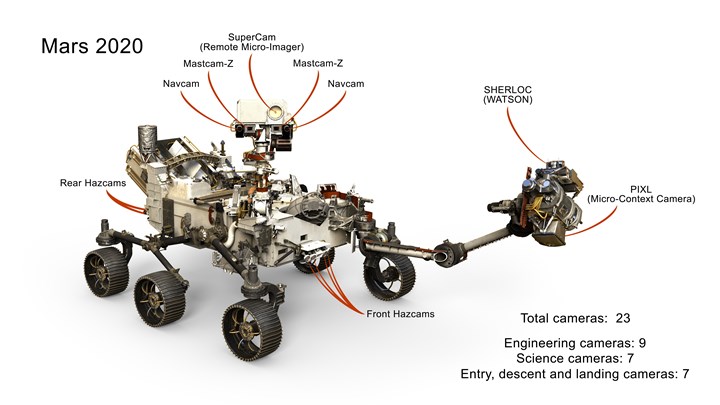Lenses Going to Mars
You may be using lenses from the company that is developing them for the 2020 Mars Rover
#hybrid
As we are still in the grips of Apollo 11 mania, it is interesting to note that a company that makes lenses for things that you may be using in your factory—lasers—or are deploying on driver assistance systems—optical and laser sensors—is producing the lenses that are going to Mars, fitted onto the Mars 2020 Rover, an electric vehicle.

The camera array on the 2020 Mars Rover
The lenses have been developed by Jenoptik Light & Optics. There are three types of lenses. First there are navigation lenses, that will be used to capture live video footage. Second, hazard avoidance lenses that will allow the rovor to ID obstacles as well as allow NASA engineers on Earth to watch the movement of the arm that will be used to collect rock and soil The third type is a cache lens, which will verify collection of the samples.
Len development was performed by Jenoptik in a clean room, which is not surprising, but what is undoubtedly different from the ordinary approach is that they had to test it under conditions that would resemble Mars: as in dealing with temperatures as low as -135°C.
The Rover, incidentally, is approximately three meters long, 2.7 meters wide, and 2.2 meters high. Were they to have curbs on Mars: curb weight 2,314 pounds.
RELATED CONTENT
-
Internal Combustion Engines’ Continued Domination (?)
According to a new research study by Deutsche Bank, “PCOT III: Revisiting the Outlook for Powertrain Technology” (that’s “Pricing the Car of Tomorrow”), to twist a phrase from Mark Twain, it seems that the reports of the internal combustion engine’s eminent death are greatly exaggerated.
-
Aluminum Sheet for EV Battery Enclosure
As the number of electric vehicles (EVs) is about to increase almost exponentially, aluminum supplier Novelis is preparing to provide customers with protective solutions
-
Chevy Develops eCOPO Camaro: The Fast and the Electric
The notion that electric vehicles were the sort of thing that well-meaning professors who wear tweed jackets with elbow patches drove in order to help save the environment was pretty much annihilated when Tesla added the Ludicrous+ mode to the Model S which propelled the vehicle from 0 to 60 mph in less than 3 seconds.


.jpg;width=70;height=70;mode=crop)






